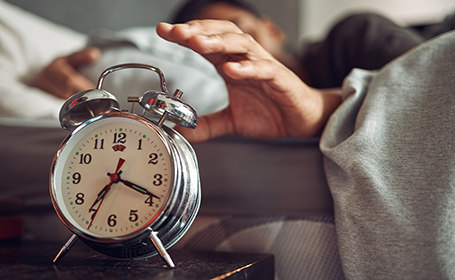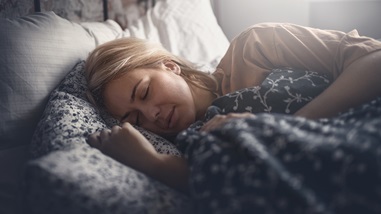
Are we getting enough sleep?
Sleep is vital to both our physical and mental wellbeing. And yet most people in the UK get less than the recommended 7-9 hours per night. We've spoken to specialists in sleep and snoring to find out the common reasons why people don't get enough sleep, and they also share their tips on improving your sleep hygiene so that you can sleep more and sleep better
How much sleep do I need?
Most adults need around eight hours of good quality sleep per night.
Some people need a bit more, some a bit less. If you regularly wake up tired and feel tired throughout the day, you probably aren't getting enough sleep.
It's thought that around three quarters of British adults sleep less than seven hours a night.
In The Great British Bedtime Report, a large study by The Sleep Council, 74% of respondents said they generally slept less than seven hours a night. 12% of participants reported sleeping for less than five hours.
So, if you feel like you're not getting enough sleep, you're not alone.
Why is sleep important?
We spend around one third of our lives asleep, and most of us know that it's important. But have you ever asked why?
Although we don't yet know everything about our need for sleep, we do know that it is vital for our bodies and minds to function.
Sleep allows us to:
- Process and store memories
- Learn new information
- Grow and repair muscles and tissue
- Produce healthy hormones
What are the benefits of a good night's sleep?
Sleeping well can offer a variety of benefits. These include:
- Boosted immunity
- Better metabolism and less chance of weight gain
- Improved mental wellbeing
- Reduced risk of diabetes
- Higher sex drive
- Lower chance of heart disease
- Increased fertility
People who experience more frequent or even chronic disturbances of sleep might have underlying sleep disorders.

What are the common short-term causes of broken sleep?
We spoke to Dr Olga Runcie, a consultant psychiatrist and sleep specialist, about common causes of sleep problems. She shares advice on the things that keep us tossing and turning, as well as tips for getting a better night's sleep:
"Having a bad night's sleep is not unusual. In fact it's a very common experience. This is especially true if you're going through a stressful time - a bereavement, health issues or any significant change in your circumstances.
"It's not just negative events that can affect your sleep either. Even the most exciting events in life, such as having a baby, can also have an impact on sleep.
"Some sleep disturbances can be caused by bad habits such as too much caffeine or exposure to bright artificial light in the hours before sleep. Working night shifts, having no exposure to daylight or travelling across several time zones can all lead to difficulties with sleep.
"Sleep can also be negatively affected by pain, the use of certain medications and by alcohol or drugs."
What are the common long-term causes of sleep problems?
"People who experience more frequent or even chronic disturbances of sleep might have underlying sleep disorders," explains Dr Runcie.
There are many different types of sleep disorder. They are generally split into six categories:
1. Insomnia
Insomnia means you struggle either to fall asleep or to stay asleep.
Studies have found that up to 15% of the general population are affected by insomnia, making it the most common type of sleep disorder.
2. Sleep-related breathing disorders
One of the most common of these is obstructive sleep apnoea.
People with this condition struggle with breathing while asleep, which leads to frequent disruption of sleep and can cause excessive tiredness during the day. Increased risk of sleep apnoea is associated with obesity, old age and loud snoring.
3. Hypersomnia
People with hypersomnia suffer from excessive sleepiness. Although these disorders are less common, they can be very distressing for sufferers and even lead to disability.
4. Circadian rhythm sleep-wake disorders
This is where people do not follow normal sleep times, for example waking up very early or sleeping little and often.
The term covers a large group of various conditions such as delayed sleep disorders, advanced sleep disorders, irregular sleep-wake rhythm, shift work and jet lag disorders. The cause tends to be an alteration in the body's timekeeping system.
5. Parasomnia
Parasomnias are undesirable events or experiences that happen during sleep or during transitions to and from sleep.
Examples include sleep walking and nightmares. Some parasomnias are triggered by stress or other medical conditions, while some are affected by genetics.
6. Sleep-related movement disorders
The most common condition in this category is restless leg syndrome, a disorder characterised by a strong, almost irresistible urge to move the limbs.
This is frequently accompanied by uncomfortable sensations deep inside the legs. These symptoms usually occur in the evening and can cause difficulties trying to fall asleep.

How does lack of sleep affect your body?
Lack of sleep can have a profound negative effect on both our physical and mental health. Studies have shown that not getting enough sleep on a regular basis is associated with issues including weight gain and obesity, diabetes, hypertension, heart disease and stroke, depression, reduced immune function and increased pain.
People who don't get enough sleep usually struggle with learning new information, experience memory problems, feel irritable and can be prone to taking excessive risks.
A lack of sleep can make us feel excessively sleepy during the day, which can result in decreased vigilance, impaired performance, difficulty making complex decisions, and a greater risk of making mistakes or having an accident.
How can I get enough sleep?
It's important to understand that sleep is not a luxury. Sleep is a core physiological necessity.
Firstly, we need to make sleep a priority, not treat it as a commodity we trade for something more exciting. Secondly, we need to identify the causes behind sleep disturbance.
Usually there is more than one reason why someone is struggling to sleep. It's important to identify all possible causes.
For some people, simple lifestyle changes and the introduction of healthier sleep habits are enough to help them get a better night's sleep. You may have heard the term 'sleep hygiene'. This is another word for healthier sleep habits. Improving your sleep hygiene can be a powerful tool in the fight against poor sleep.
It's important to understand that sleep is not a luxury. Sleep is a core physiological necessity.
10 tips to improve your sleep hygiene
Making simple changes to your routine can help you to get to sleep better and encourage better sleep quality.
1. Keep regular sleep hours
Getting up and going to bed at roughly the same time every day will train your body to sleep better and could banish feelings of tiredness during the day.
2. Create a calm place to sleep
If your bedroom is a peaceful space, it should encourage you to rest and sleep.
3. Get a comfy bed
The comfier you are, the better night's sleep you'll have. A good mattress and pillows could make all the difference.
4. Stay active
Regular exercise, even as little as 10 minutes, can really improve your sleep quality. However, try not to exercise too close to bedtime.
5. Cut down on caffeine
If you're having trouble sleeping, reducing your intake of tea, coffee or energy drinks - especially in the evening - could help you to fall asleep.
If you enjoy a warm drink in the evening or before bed, try something caffeine-free such as milk or herbal tea.
6. Drink less alcohol
Although alcohol might help you to fall asleep initially, it can disrupt your sleep later in the night, so it's best to avoid it - or at least cut down - if you're suffering from sleep problems.
7. Don't smoke
Nicotine, like caffeine, is a stimulant. Smokers suffer with more sleep problems than non-smokers. Perhaps it's time to give up?
8. Relax before bed
Whether it's having a warm bath or doing some gentle yoga or meditation, a relaxing activity before bed can help you to drift off faster.
9. Expose yourself to natural light
Exposure to sunlight in the day, and to darkness at night, helps your body to regulate its sleep-wake cycle.
10. And avoid light from screens
Artificial light can disrupt our body's sleep-wake cycle. Try not to keep your phone or tablet near you when you sleep, and avoid screens - including televisions - for an hour or so before bedtime.
When is it time to seek help?
If your sleep difficulties are chronic, causing distress and seriously affecting your wellbeing, it's important to speak to a specialist.
There are a range of very effective therapies for different types of sleep disorders. For example, CBT (cognitive behavioural therapy) can be used to ease insomnia, while light therapy and chronotherapy can help with sleep rhythm disorders.
There are also certain medications that can help you to sleep better, but these need to be appropriately prescribed by a specialist.
Common sense changes such as losing weight, not drinking alcohol within three hours of bedtime and stopping smoking can all have a beneficial effect.

What if my problems are to do with snoring?
As Prof. Anshul Sama, an ear, nose and throat (ENT) consultant at The Park Hospital explains: "In most cases, snoring isn't a cause for concern for the snorer, although their partner might tell a different tale!"
Indeed, the only solution for some couples is to sleep in separate rooms, but going to such measures for a good night's sleep can spell disaster for a relationship.
While snoring does not generally pose any health issues for the snorer, it can be a symptom of sleep apnoea. This is a condition which stops you breathing for a period of time as you sleep, cutting off oxygen to the brain.
"This can occur multiple times each hour at night and leaves you with a muzzy-type headache and feeling sluggish in the morning," explains Mr Lance Hollis, an ENT consultant at The Droitwich Spa Hospital.
For many people, stopping snoring can be as simple as making a few lifestyle changes. According to Prof. Sama, "Common sense changes such as losing weight, not drinking alcohol within three hours of bedtime and stopping smoking can all have a beneficial effect."
He also advises snorers to sleep on their side and use a thin pillow. While having pets in the bedroom is a definite no.
If snoring is affecting you or your partner, it's worth booking an appointment at one of our sleep clinics to see what options are available to you. In Mr Hollis' words: "Snoring can be controlled but you have to take steps towards controlling it so that both you and your partner get a good night's sleep."
Tags
How do I book an appointment?
If you're concerned about symptoms you're experiencing or require further information on this subject, talk to a GP or see an expert consultant at your local Circle Hospital.